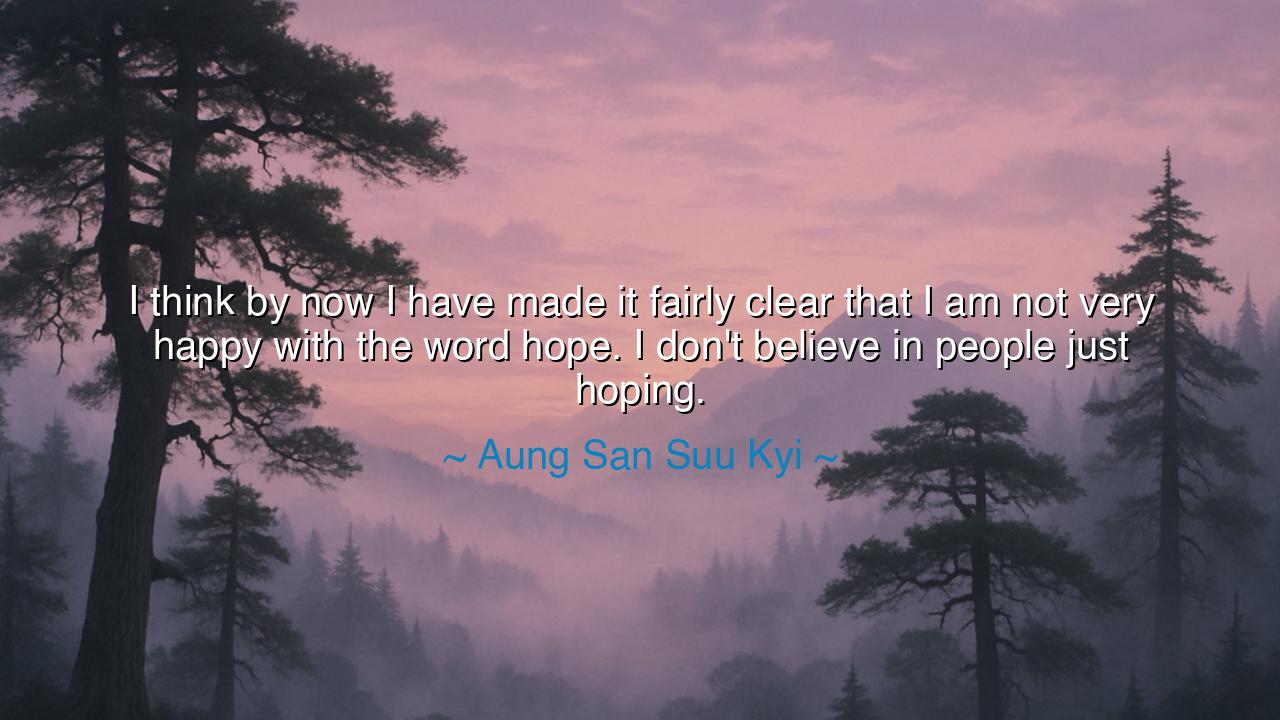
I think by now I have made it fairly clear that I am not very
I think by now I have made it fairly clear that I am not very happy with the word hope. I don't believe in people just hoping.






“I think by now I have made it fairly clear that I am not very happy with the word hope. I don’t believe in people just hoping.”
Thus spoke Aung San Suu Kyi, the daughter of struggle and the voice of a nation long bound by silence. In these words, she rejects the comfort of idle hope—the kind that waits for salvation without labor, the kind that dreams without daring. She does not deny the value of vision or the light of the future, but she warns against the weakness of hoping without action. To her, true strength lies not in wishful waiting, but in the will to act, to rise, and to bring forth the change one desires. Her words ring not as cynicism, but as a call to courage—an awakening of the spirit that refuses to depend on miracles when discipline and deed are required.
The origin of this thought comes from the crucible of Suu Kyi’s life itself. Born into the lineage of General Aung San, the hero of Burma’s independence, she inherited both his vision and his unfinished fight. For years, she stood as a symbol of resistance against oppression, enduring isolation, imprisonment, and the constant threat of death. During her long house arrest, the world hailed her as a beacon of hope, yet she herself distrusted that word. She saw how easily people turned to it as a substitute for effort, how nations and individuals alike could use “hope” as a shield for inaction. Thus, she spoke this truth: hope without action is a hollow prayer.
Her view recalls the wisdom of the Stoics, those ancient philosophers who taught that virtue lies in what one does, not what one merely desires. The Stoic sage does not wait for fate to grant freedom; he builds it within himself through courage and reason. Likewise, Suu Kyi believed that freedom could not be given to her people—it must be claimed. “Just hoping,” she implies, is the language of those who have surrendered their power. Real hope, the kind that changes worlds, must be embodied in effort, made flesh through perseverance and sacrifice.
History itself is shaped not by the dreamers alone, but by those who act upon their dreams. Consider Mahatma Gandhi, who faced the vast empire of Britain with nothing but his will. He did not sit and hope for justice—he became justice through his discipline and refusal to yield. Or consider Harriet Tubman, who did not hope that her people would one day be free; she returned again and again through the shadow of death to lead them herself. These were souls who understood Suu Kyi’s wisdom: that hope is not the waiting of the weak, but the striving of the brave.
And yet, Suu Kyi’s words are not a condemnation of hope itself, but a refinement of it. She reminds us that hope is sacred only when it breathes through action. The farmer who plants seeds in the earth does not simply hope for rain—he tills, waters, and guards the soil. The artist does not hope for beauty—he creates it through years of toil. The activist does not hope for justice—he carries it into the world at the risk of his life. Hope without labor is a dream that never wakes; hope with labor is the dawn that follows the night.
Her message also speaks to the dangers of complacency. When people rely too heavily on hope, they may come to believe that change will arrive by destiny rather than by determination. Suu Kyi warns against this poison of passivity. She calls upon humanity to take responsibility for its own freedom. Every man and woman must rise and work for the world they wish to see. For to say, “I hope,” without saying, “I will,” is to surrender the very gift of agency that makes us human.
So take this lesson to heart, O seeker of meaning: do not merely hope—act. Do not sit beneath the tree and pray for fruit; climb, reach, and labor for it. Let your hope become the fire that moves your hands and your voice. Dream, yes—but dream as the warrior dreams, with sword in hand and sweat upon the brow. For as Aung San Suu Kyi teaches, hope alone is but a whisper; hope in action is a roar that can shake the foundations of tyranny and despair. And when you live this truth—when your every deed becomes an answer to your own longing—you will find that you no longer need to believe in hope, for you have become its living embodiment.






AAdministratorAdministrator
Welcome, honored guests. Please leave a comment, we will respond soon